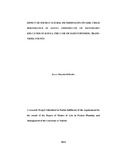| dc.description.abstract | This study sought to investigate the effect of socio-cultural determinants on girl child academic performance in Kenya Certificate of Secondary Education in Saboti Division, Tans-Nzoia County of Kenya. The research questions sought to find out to what extent FGM, early marriages, peer pressure, parental attitude and domestic chores influence girl child academic performance in KCSE. Although a number of studies have been done on factors affecting girl’s performance in other parts of the country, no specific study has investigated the continued poor performance of girls in KCSE in Saboti Division in spite of free secondary education. The study adopted descriptive and ex-post facto designs. The dependent variable of the study was girl child academic performance in KCSE. Independent variables were FGM, early marriages, peer pressure, attitude and domestic chores. The theoretical framework that guided the study was Pearson’s gender theory. The theory states that the society views all activities that are carried out to be based on social roles and interactions of men and women. The total population for this study was 1199 respondents which will consist of 200 teachers, 990 girl students and 9 head teachers, the sample size was 483 respondents. Nine schools were selected using simple random sampling. Data was collected using questionnaires and interview guide. Prior to the actual data collection, a pilot study was conducted to ascertain the reliability and validity of the instruments. The study gathered both qualitative and quantitative data. Quantitative data was analyzed using descriptive statistics including frequencies and percentages, t-test and multiple linear regressions were used to analyze the statistical data. Data was classified, tabulated and analyzed manually. Computation of percentages was done after which the findings were presented in tables. Analyzed data was interpreted and conclusions drawn. Findings indicated that FGM is still practiced in Saboti despite the fact that it is illegal in Kenya, and it has the highest influence on academic performance of the girl child (90.7%), followed by parental attitude (85%), peer pressure (72%), early marriages (65%) while domestic chores had least influence (20%). Head teachers in Saboti Division are male at 88.89% as compared to female at 11.11%, similar to the teachers female at 35% male at 65%. The study recommends a sensitization programme to change the attitude of those practicing FGM so as to stop it. | en_US |

